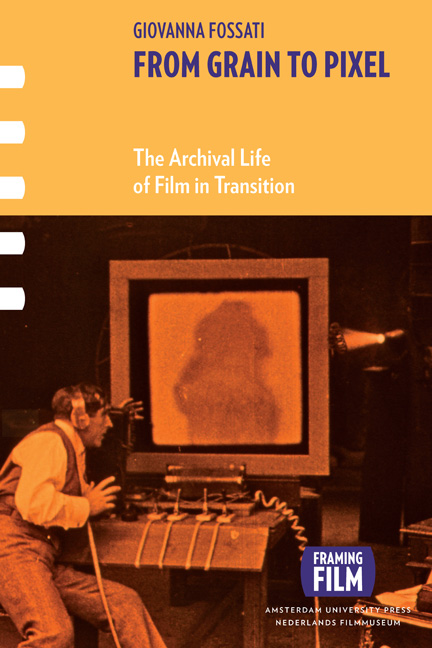Book contents
- Frontmatter
- Deduction
- Contents
- Acknowledgements
- Framing Film (in Transition): an Introduction
- Practice and Theory of (Archival) Film
- Theorizing (Archival) Practice
- A New Mindset for (Archival) Film in Transition: a Conclusion
- Notes
- Glossary Of Technical Terms
- List of Illustrations
- Filmography
- Bibliography
- Index
Chapter Two - Theorizing Archival Film
Published online by Cambridge University Press: 16 February 2021
- Frontmatter
- Deduction
- Contents
- Acknowledgements
- Framing Film (in Transition): an Introduction
- Practice and Theory of (Archival) Film
- Theorizing (Archival) Practice
- A New Mindset for (Archival) Film in Transition: a Conclusion
- Notes
- Glossary Of Technical Terms
- List of Illustrations
- Filmography
- Bibliography
- Index
Summary
THE SCHOLAR, THE ARCHIVIST AND THE FILM
In this time of technological transition from analog to digital film, along with changing practices, different perspectives, expectations and demands are at play. Scholars are re-evaluating the object of their study and archivists are rethinking the aims of their work. Both are questioning the nature of film and how film is changing while moving from grain to pixel. It is precisely at this time of transition that the dialogue between scholars and archivists can be particularly valuable for both theory and practice.
However, although both film archivists and film scholars are dealing with similar dilemmas, the dialogue between them is limited. In particular, archivists are quickly discouraged by theoretical approaches that seem far away from their practical concerns and scholars are suspicious of practice driven by compromises. As a result, scholars often neglect film as material artifacts, and archivists work with little reference to theoretical frameworks derived from academic research. As film theorists today can rightly pose the questions:
What is left, then, of cinema as it is replaced, part by part, by digitization? Is this the end of film, and therefore the end of cinema studies? Does cinema studies have a future in the twenty-first century? (Rodowick, 2007: 8)
The same questions can be rephrased and posed by film archivists:
What is left, then, of film as it is replaced, part by part, by digitization? Is this the end of film, and therefore the end of film archives and museums? Do film archives have a future in the twenty-first century?
Answers that address both questions are rarely attempted. There is very little theoretical work in the field of film and media studies with explicit reference to archives and archival practice. In a way, reading film and media literature one might think that the materiality of film, the significance of film as material artifact, has very little importance for theory, and that the objects of the scholars are not necessarily the same of the archivists.
There are a few important exceptions to this lack of dialogue, as a number of seminal works have been inspired, in one way or another, by the already mentioned FIAF Conference held in Brighton in 1978.
- Type
- Chapter
- Information
- From Grain to PixelThe Archival Life of Film in Transition, pp. 103 - 145Publisher: Amsterdam University PressPrint publication year: 2018



